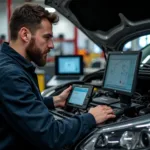Auto Parts Die Casting Services are revolutionizing the automotive industry. From enhanced performance to intricate designs, understanding die casting is crucial for both consumers and businesses. This article delves into the intricacies of this process, exploring its benefits, applications, and the future it holds for auto part manufacturing.
What are Auto Parts Die Casting Services?
Die casting is a metal casting process characterized by forcing molten metal under high pressure into a mold cavity. The mold cavity is created using two hardened tool steel dies which have been machined into the shape of the desired casting. These dies are designed to withstand the high pressure and temperature involved in the process. Auto parts die casting services specialize in creating precise and complex components for vehicles using this method.
Think of it like injecting plastic into a mold to create a toy, but on a much larger and more sophisticated scale, using molten metal instead of plastic. This process allows for the creation of parts with intricate details and tight tolerances, which are essential for many automotive applications. You can find more about getting quotes for these services at auto parts die casting services quotes.
Benefits of Die Casting for Auto Parts
Die casting offers numerous advantages for auto part manufacturing. The process creates parts with exceptional strength and durability, essential for withstanding the stresses of vehicle operation. Additionally, die casting allows for complex shapes and intricate details, enabling the production of lightweight yet robust components.
- High Dimensional Accuracy: Die casting produces parts with tight tolerances, minimizing the need for secondary machining.
- Excellent Surface Finish: Parts often require minimal surface finishing, reducing production time and cost.
- High Production Rates: Die casting is a rapid process, ideal for high-volume manufacturing.
Applications of Auto Parts Die Casting Services
From engine blocks to intricate transmission components, die casting plays a vital role in modern vehicle production. The process is suitable for a wide range of metals, including aluminum, zinc, and magnesium, allowing for tailored solutions based on specific application requirements. Here are some examples:
- Engine Components: Cylinder heads, engine blocks, and intake manifolds.
- Transmission Parts: Gear housings, clutch components, and torque converters.
- Chassis Components: Steering knuckles, suspension parts, and brake calipers.
- Body Panels: Door handles, mirror housings, and decorative trim.
If you need an auto quote service, you can find resources online that connect you with die casting service providers.
The Future of Auto Parts Die Casting Services
The auto industry is constantly evolving, and die casting technology is keeping pace. Innovations in die materials, process control, and automation are driving further improvements in part quality, production efficiency, and cost-effectiveness.
- Lightweighting: The demand for lighter vehicles is pushing the adoption of lightweight metals like magnesium and aluminum in die casting.
- Increased Automation: Robotics and automation are being integrated into die casting processes, enhancing precision and speed while reducing labor costs.
Conclusion
Auto parts die casting services are an integral part of modern automotive manufacturing. From engine components to body panels, die casting provides a versatile and efficient method for producing high-quality, precise, and durable parts. As the automotive industry continues to evolve, die casting will undoubtedly play a crucial role in shaping the future of vehicle design and performance.
FAQ
-
What materials are commonly used in auto parts die casting? Aluminum, zinc, and magnesium are commonly used due to their favorable properties.
-
Is die casting suitable for high-volume production? Yes, die casting is ideal for high-volume manufacturing due to its speed and efficiency.
-
What are the advantages of die casting over other manufacturing methods? Die casting offers high dimensional accuracy, excellent surface finish, and the ability to create complex shapes.
-
What types of auto parts are typically made using die casting? Engine components, transmission parts, chassis components, and body panels are often made using die casting.
-
What is the future of die casting in the automotive industry? The future of die casting includes increased automation, the use of lightweight metals, and further advancements in process control.
-
How can I get a quote for auto parts die casting services? You can obtain quotes from specialized die casting companies or use online platforms that connect you with service providers.
-
What factors influence the cost of die casting services? The material used, the complexity of the part, and the volume of production all impact the overall cost.
Common Scenarios & Questions
-
Scenario: A manufacturer needs to produce a complex engine component with tight tolerances. Question: Is die casting a suitable solution? Answer: Yes, die casting excels at producing complex parts with high dimensional accuracy.
-
Scenario: An automotive designer wants to create a lightweight, visually appealing door handle. Question: Can die casting meet these requirements? Answer: Yes, die casting allows for the use of lightweight materials and can achieve intricate designs.
Further Exploration
For more information on related topics, you might be interested in exploring articles on material selection for die casting and the latest advancements in die casting technology.
Contact Us
Need support? Reach out to us via WhatsApp: +1(641)206-8880, Email: [email protected] or visit us at 321 Birch Drive, Seattle, WA 98101, USA. Our customer service team is available 24/7.

